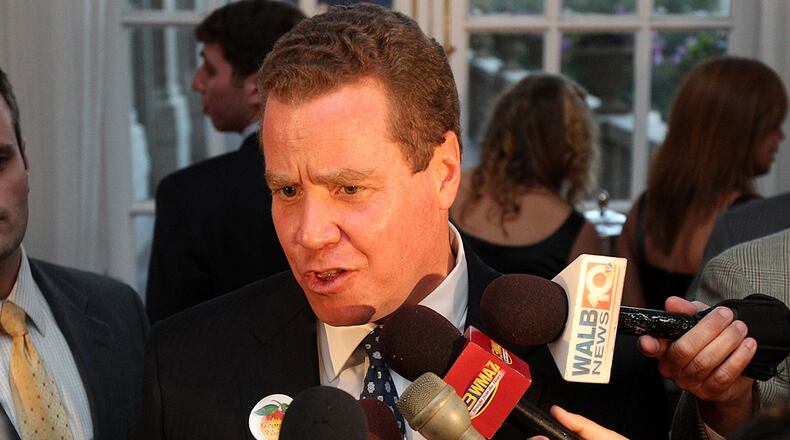When an ethics complaint was filed against Georgia Insurance Commissioner John Oxendine in 2009, the colorful politician was among the front-runners in the race for governor and had industry contacts helping to bankroll what looked to be a strong bid for the Republican nomination.
Nearly a decade later, Oxendine — who wound up losing in the GOP primary — is still battling Georgia’s ethics commission over the original complaint, as well as newer ones alleging that he misspent campaign contributions and illegally loaned his business money he raised from supporters.
Almost half of the more than $700,000 in leftover campaign contributions that could have been returned to donors has been instead spent on legal fees and expenses, according to an Atlanta Journal-Constitution analysis of state disclosures. At the end of 2018, his campaign account had $281,000 left in it.
Both the time involved and the amount of money Oxendine has spent on legal expenses fighting the complaints are extraordinary for state ethics commission cases, which typically result in fines of a few thousand dollars at most if a candidate or politician is found to have violated the law.
“This is the longest-running case I have been aware of,” said William Perry of Georgia Ethics Watchdogs.
Rick Thompson, a former executive secretary of the state ethics commission, called the $328,000 Oxendine has spent on legal fees and court costs “a ludicrous amount.”
Ethics commission staffers said they hoped to have the case settled by first half of the year. His lawyer, Douglas Chalmers, declined to comment for this story.
Oxendine, who served as Georgia’s insurance commissioner for 16 years, has battled ethics issues since the early days of his gubernatorial campaign. Following a 2009 AJC report, a complaint was filed accusing two insurance companies of funneling $120,000 in illegal contributions to his campaign.
An ethics complaint against the insurers accused of giving the money to Oxendine was dismissed in 2014 because the commission’s staff had made so little progress on it. But the commission didn’t dismiss charges against Oxendine, the recipient of the donations.
The case remained largely dormant until the AJC reported in 2015 that he failed to return to donors more than $500,000 worth of leftover contributions from his gubernatorial bid and spent money raised for Republican runoff and general election campaigns that he never ran because he lost in the GOP primary.
Oxendine amended his reports in October 2015 to show more than $700,000 left over, including $237,000 in loans to his law firm, which he repaid with $8,700 worth of interest.
Following the AJC report, ethics commission staffers filed an amended complaint, accusing him of improperly spending more than $208,000 raised for the runoff and general elections and accepting more than the legal limit in contributions from 19 donors. The commission dismissed many of the charges in December 2015 after Chalmers argued that the statute of limitations had run out on charges involving the 2010 campaign.
But the commission kept alive the allegations that he took illegal contributions from the insurance companies and spent money raised for races he never ran, and the case wound up in court.
In 2017, the commission filed yet another complaint, alleging that Oxendine illegally benefited personally when his campaign loaned money to his business.
The cases have been unusual because Oxendine fought his battles in court, rather than solely in front of the ethics commission, like most candidates. Oxendine’s campaign has paid Chalmers, who has represented him in the cases since 2015, about $185,000 through the end of 2018. But he has also paid lawyers to fight a subpoena for bank records related to the loan.
While ethics officials said the leftover money should have been returned to donors, it is legal for campaigns to use it to pay ongoing legal expenses. Former candidates can also give it to other candidates.
While he was still fighting the ethics charges in 2018, Oxendine used leftover campaign money to give $13,200 each to Brian Kemp’s successful bid for governor and Jim Beck’s equally successful campaign for insurance commissioner.
Perry said the Oxendine case is an example of a system that allows a big-money candidate to delay ethics charges indefinitely.
“It’s not fair to the average candidate. … Ninety-five percent of candidates don’t have the kind of money to fight this way,” Perry said. “This is more about kicking the can down the road than proving he is right or having a legal triumph.”
Perry said lawmakers should consider whether candidates with fat bank accounts should be able to use leftover money — rather than their own — to fight such battles. Otherwise, they can ignore disclosure laws and just count on having the money to fight any possible complaints about violations.
“It’s not John Oxendine’s money, he has other people’s money to gamble with in the legal system,” Perry said. “He is using money people have given him. He doesn’t have to sweat this being a personal expense. Our ethics laws should be changed so you are not allowed to do that.”
Stay on top of what’s happening in Georgia government and politics at ajc.com/news/georgia-government/.
About the Author
Keep Reading
The Latest
Featured



